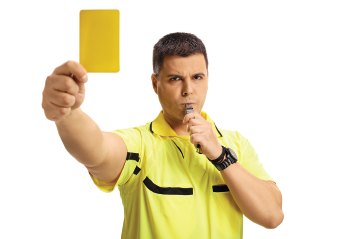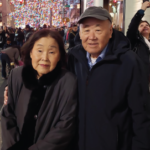Independence Day. I can’t wait.
Generally, it’s not a holiday that carries a lot of meaning for me. Having grown up in New York and Boston, the smaller firework displays that take place in Baltimore fail to impress. Also, as a program director, the holiday falls in the middle of the new fellows’ first week of work, so in my house, it’s not much of a holiday. Every year, I watch my colleagues flee Baltimore’s July heat, as I stay behind to wanly welcome my trainees to their new home.
This year is different. I know this because Joe told me so.
On March 12, during his first primetime speech as U.S. president, Joe Biden announced, “By July the 4th, there’s a good chance that you, your families and friends will be able to get together in your backyard or in your neighborhood and have a cookout or a barbecue and celebrate Independence Day. After this long hard year, that will make this Independence Day something truly special, where we not only mark our independence as a nation, but begin to mark our independence from the virus.”1
Biden’s staff was busy revising his words almost as they were leaving his mouth. White House press secretary Jen Psaki clarified, “We’re talking about the American people being motivated and excited by the fact that … if they get vaccinated … there will be access to vaccines; they will be eligible. And if they take steps to get vaccinated, to continue to wear a mask, to continue to observe social distancing, then looking ahead to July 4th as an aspirational moment where people can plan small get-togethers in their backyard.” She further cautioned that they were not envisioning that we would be able to return to “large events with lots of people together.”2
President Biden’s words reminded me of another presidential speech. On Sept. 12, 1962, President John F. Kennedy took the podium at Rice University to announce that “we choose to go to the moon”:3
We set sail on this new sea because there is new knowledge to be gained, and new rights to be won, and they must be won and used for the progress of all people. For space science, like nuclear science and all technology, has no conscience of its own. Whether it will become a force for good or ill depends on man, and only if the United States occupies a position of pre-eminence can we help decide whether this new ocean will be a sea of peace or a new terrifying theater of war. I do not say that we should or will go unprotected against the hostile misuse of space any more than we go unprotected against the hostile use of land or sea, but I do say that space can be explored and mastered without feeding the fires of war, without repeating the mistakes that man has made in extending his writ around this globe of ours.
One problem: At the time, he had no idea whether any of this was possible.
Roger Launius, the former chief historian for the National Aeronautics and Space Administration (NASA), said, as kindly as possible, “I think he thought it could happen.”4 NASA scientists had identified reaching the moon as a potential long-term goal; President Kennedy chose to interpret that as an enthusiastic yes.
I think the same may be true of President Biden’s words. His staff already seem worried that he may have overpromised, but that really doesn’t matter right now. Just the image of a summer barbecue or picnic with a few extra people is so enticing, I think he will be forgiven if he misses the mark.
But about that mark—people are already getting vaccinated at record rates. Why can’t the vaccinated take advantage of their new immunity now?
Medical Passports, in Yellow
If you are a soccer fan, you know a yellow card is used by the referee to discipline players for misconduct or failing to follow the rules. A player who is given a yellow card may continue to play, but he is being placed on notice: if he receives a second yellow card, the player is dismissed from the field.5
If you are a world traveler, you know that a Yellow Card or Carte Jaune is the sobriquet for an International Certificate of Vaccination or Prophylaxis (ICVP). On May 25, 1951, the World Health Organization (WHO) adopted the International Sanitary Regulations that created an internationally recognized certificate that could be used to document receipt of a vaccine recognized by the WHO, such as the vaccines against cholera and smallpox.6 The Yellow Card nickname was inevitable, because the certificates were issued on yellow pieces of paper; the fact that these certificates were often used, specifically, to document yellow fever vaccination sealed the deal.

Ljupco Smokovski / shutterstock.com
The Yellow Card holds the expected demographic information, either in English or French, followed by a list of vaccinations; a stamp from the administering center makes it official. Because it is internationally recognized, it essentially serves as a medical passport for the traveler who aspires to visit a country where specific preventable diseases are endemic.
It’s easy to see why interest in Yellow Cards has increased of late: They provide an easy answer to an awkward question. It is heartening to know the U.S. is vaccinating more than 3 million people in a single day.7 With three coronavirus vaccines already having received emergency use authorization by the U.S. Food & Drug Administration (FDA), that record may be broken serially. The problem is that, even with vaccinations proceeding at breakneck speed, there will still be a prolonged period when the world is divided between the have-been-vaccinated and the have-nots.
Until everyone is immune, what do we do? Should everyone continue to politely mask and distance and avoid all human contact until we reach the vaccination finish line?
The U.S. Centers for Disease Control & Prevention (CDC) has said aloud what all of us were thinking: On March 9, it updated its guidance to state that if you have been fully vaccinated:8
- You can gather indoors with fully vaccinated people without wearing a mask;
- You can gather indoors with unvaccinated people from one household without masks; and
- If you have been in contact with someone who has COVID-19, you do not need to isolate.
Nationwide, you could almost hear thousands of car doors simultaneously slamming, as grandparents across the country jumped into their vehicles to see their grandchildren.
At the same time, thousands more have been parsing the CDC recommendations as if they were a plot point in The Da Vinci Code. If the fully vaccinated can gather maskless, why shouldn’t they be able to gather in a Boeing 737 or on a beach or on a cruise ship? Do we really need to wait for the whole world to be vaccinated before we can get on with our lives?
Enter the Yellow Card.
Substituted Trust
Actually, probably not. The same fraudsters who provided you with dubious documentation to get past the bouncers at your local college pub have already turned their talents to vaccine documentation. Add to this the problems with verifying documentation at every port of entry.9 Just picture the line for immigration and passport control the last time you flew into the U.S. Now imagine a second line, just as long, for a second set of agents to review your Yellow Card. Already, this is starting to sound less like the happy ending to 2021 that we all want.
There is hope. The model is Global Entry, which was created by the U.S. Customs and Border Protection Agency to expedite clearance traveling to the U.S. For a modest fee, the Department of Homeland Security pre-vets low-risk travelers so they don’t have to be interviewed by an immigration agent. A quick interaction with a computer is all it takes to confirm your identify and your history, before you are whisked away to baggage claim.
An electronic Yellow Card would solve many problems. Just imagine a world in which you carried a phone app or an RFID card that you could flash at your flight attendant or restaurant host or concert ticket taker—or anyone else who wanted proof of your vaccinated status—before they step aside and allow you to reclaim a small part of your previous life.
The problem is coming up with a universally agreed-upon format to both store and transmit the relevant data, while offering a modicum of security and privacy for the individual.
The people who brought you the Linux operating system are on the case. The Linux Foundation Public Health (LFPH) is hosting the COVID-19 Credentials Initiative (CCI) to create a standardized, open-source approach to vaccine credentials, with an emphasis on interoperability and cybersecurity.10
Jenny Wanger, director of programs at LFPH puts it eloquently: “Ultimately, these credentials are a way of substituting trust. One of the things the pandemic has done that’s, I think, been psychologically damaging for so many people is all of a sudden you can’t trust anybody, even your family.”11 An electronic Yellow Card would, once again, allow us to trust strangers with our health.
Several candidates are already vying for dominance in this space:
- IATA Travel Pass. If you are flight-savvy, you recognize the International Air Transport Association from the database it maintains to help travel agents book flights. This professional organization, however, supervises many aspects of commercial flying, and therefore has a particular interest in making this technology work.12
- CommonPass: This is envisioned as a phone app, created by the World Economic Forum and the Commons Project Foundation in Switzerland, that would allow travelers to provide vaccination records without revealing other protected health information.13
- Augmented Borders: This technology, being developed by IDEMIA, would allow you to clone the chip in your passport onto your phone. It is not being specifically developed to serve as an immunity passport but adding such a feature would be a snap.14
The Vaccinated Caste
From a purely medical standpoint, any of these products could represent an important step toward making people comfortable again with travel. The ethics of the vaccine passport, however, are murky.
First, not all are comfortable with creating a universe in which the unvaccinated are disadvantaged. Requiring vaccinations in some circumstances is generally accepted—to attend public school, for example. But even for routine vaccinations, the courts continue to be flooded with requests for exceptions based on personal beliefs.15
Add to this the newness of the coronavirus vaccine technology and the public’s varying opinions on the threat posed by SARS-CoV-2, and it’s not surprising that the resistance is higher. My institution, for example, has elected not to require vaccination because no vaccine is, technically, FDA approved. Such gossamer arguments will allow many institutions to delay making coronavirus vaccination mandatory, but we will eventually have to address this problem head-on.
More concerning is that vaccine passports will simply reinforce the social inequities that influence access to coronavirus vaccines in the first place. It surprised absolutely no one to learn that the wealthy managed to jump the line and buy early access to vaccine. Many others managed to be first in line simply because they had enough free time to work the system.
The CDC has recorded race and ethnicity for only half the patients who have received a coronavirus vaccination in the U.S. From the available data, however, it seems 65% of patients who have received the coronavirus vaccine, as of March 1, are white. Only 9% were Hispanic and 7% were Black. In other words, white patients are being vaccinated much faster than Hispanic or Black patients. On the other hand, non-Hispanic Black patients account for only 12% of the total U.S. population, but 34% of COVID-19 deaths.16 Creation of vaccine passports, potentially, may create one more way in which minorities may suffer at the hands of COVID-19.
The issue is even more fraught when one looks beyond our borders. One hundred thirty nations have not yet administered a single dose of a coronavirus vaccine, representing 2.5 billion people who are being left behind.17 Worldwide, wealthy nations are flexing soft power, offering vaccines in exchange for some consideration at a later date, like a mobster making an offer that can’t be refused. Forcing these nations to sit out international travel and commerce while waiting for these vaccines simply reinforces their disadvantage.
There are no easy answers. Some countries and airlines are already requiring evidence of vaccination prior to travel. Israel has already introduced a Green Pass, which allows the COVID-immune to access a range of services, including restaurants, gyms and theaters. Later this year, Europe will begin to welcome back tourists who can prove they received an EMEA-approved coronavirus vaccine. Meanwhile, it’s important we find new ways of getting coronavirus vaccines to those who need them most.
Souls to the polls efforts, in which people would vote after religious services, transformed electoral politics in the U.S.; similar efforts may help us reach those who may not actively seek vaccination.18 Mobile vaccine clinics may further extend our reach.19
At the end of the day, vaccine passports may make some of our lives easier, but the ultimate goal is to make sure we can all enjoy those Independence Day cookouts, together.
 Philip Seo, MD, MHS, is an associate professor of medicine at the Johns Hopkins University School of Medicine, Baltimore. He is director of both the Johns Hopkins Vasculitis Center and the Johns Hopkins Rheumatology Fellowship Program.
Philip Seo, MD, MHS, is an associate professor of medicine at the Johns Hopkins University School of Medicine, Baltimore. He is director of both the Johns Hopkins Vasculitis Center and the Johns Hopkins Rheumatology Fellowship Program.
References
- Remarks by President Biden on the American Rescue Plan. The White House. 2021 Mar 12.
- Press briefing by Press Secretary Jen Psaki. The White House. 2021 Mar 12.
- John F. Kennedy Moon Speech—Rice Stadium. Rice University. 1962 Sep 12.
- Wall M. Apollo 11: Why JFK believed his bold moonshot could actually happen. Space.com. 2019 Jul 17.
- Stamp J. Who invented the yellow card? Penalty cards are a surprisingly recent creation that were, perhaps unsurprisingly, inspired by traffic lights. Smithsonian Magazine. 2014 Jul 8.
- World Health Organization. Strengthening health security by implementing the International Health Regulations (2005): International certificate of vaccination or prophylaxis. 2007 Jun 15.
- Staff. See how the vaccine rollout is going in your county and state. The New York Times. 2021 Apr 26.
- U.S. Centers for Disease Control & Prevention. When you’ve been fully vaccinated: How to protect yourself and others. 2021 Apr 2.
- World Health Organization—Zimbabwe. Fighting fake immunization travel certificates with frontier technologies. 2020 Oct 30.
- Linux Foundation Public Health. Collaborating to battle COVID-19. 2021.
- Adams RD. Open source vaccine passports: Linux Foundation Public Health talks development, security and digitally restoring trust. 2021 Feb 8.
- International Air Transport Association. IATA travel pass initiative. 2021.
- The Commons Project Foundation. CommonPass. 2021.
- IDEMIA. Augmented borders: Changing perspectives for efficient, intelligence-led border control. 2021.
- Craig G. Judge keeps alive lawsuit from family seeking exemption to school vaccination for son. Rochester Democrat and Chronicle. 2020 Apr 27.
- Holmes L, Enwere M, Williams J, et al.Black–white risk differentials in COVID-19 (SARS-COV-2) transmission, mortality and case fatality in the United States: Translational epidemiologic perspective and challenges. Int J Environ Res Public Health. 2020 Jun;17(12):4322.
- Beaubien J. You think the U.S. has vaccine issues? 130 countries haven’t even started vaccinating. NPR. 2021 Feb 14.
- Hoffman J. Clergy preach faith in the COVID vaccine to doubters. The New York Times. 2021 Mar 14.
- Schumaker E. These cities are deploying mobile vaccine clinics to reach vulnerable people: In Los Angeles, New York and Texas, clinics are meeting people where they are. 2021 Feb 4.



